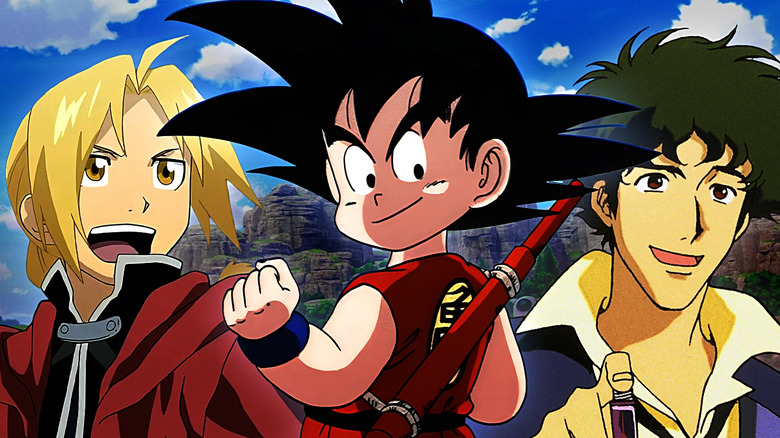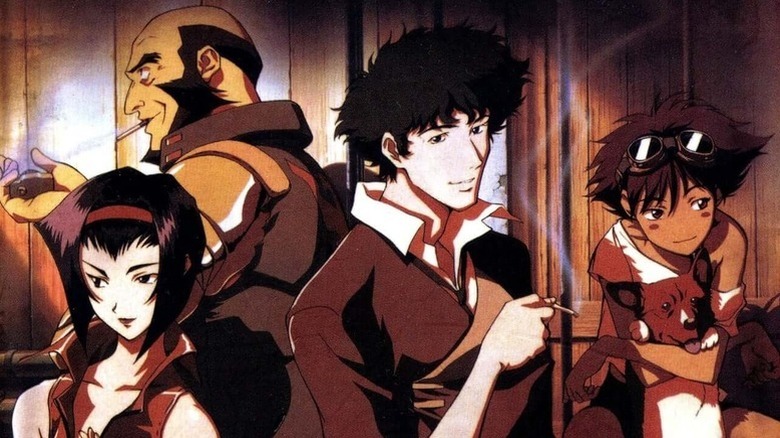5 Essential Anime Series That Everyone Should Watch At Least Once
We may receive a commission on purchases made from links.
In Japan, "anime" just refers to any work of animation. But across the globe, we know anime to mean specifically Japanese animation. Japan's large animation industry — and cultural omnipresence of manga (for proof of that, see Tatsuki Fujimoto's "Look Back") that studios can use for source material — have created a pop culture bubble that many, many people outside Japan have happily jumped into.
There is a lot of anime out there — too much to ever watch all of it. So, if you're going to take this journey, you'll have to refine your prioritization skills in the exact same way an action anime hero like Yusuke in "Yu Yu Hakusho" trains to become the strongest they can be.
The first steps will be the hardest. Which of the thousands of anime series out there should you start with? And once you've finished popping your sakuranbo, what should be the second anime? And then, if you're hooked, your third and fourth, etc.?
That's about as big a question as asking, "How should I get into movies?" The best way is to pin down the existing genres and stories you like and look for classics within those boxes. Like film, though, there is an essential anime canon that any self-respecting enthusiast should explore.
Cowboy Bebop
A group effort by animation studio Sunrise, the space Western "Cowboy Bebop" first aired on Japanese TV in 1998. Almost 30 years later, it's still the go-to recommendation for a "gateway anime," especially among Americans. And while "Cowboy Bebop" was originally conceived as a marketing vehicle for spaceship toys, series director Shinichirō Watanabe ultimately captured lightning in a saxophone-shaped bottle.
In 2071, humanity has spread out across the solar system and terraformed various planets and moons. Earth has seen better days, and now Mars is the center of human culture. "Cowboy Bebop" focuses on a crew of bounty hunters traveling across these settled planets (their ship is named "the Bebop"). They nail crooks that range from petty drug-dealing thugs to eco-terrorists, AI-cultists, and flying super-soldiers dressed like clowns.
The crew includes enigmatic Bruce Lee wannabe Spike Spiegel, a former gangster running from his past; retired cop Jet Black, who bears a cybernetic arm from an attack on his last case; Faye Valentine, an amnesiac femme fatale; Radical Edward, a young girl and genius hacker; and Ein the data dog, a genetically altered super-intelligent (but still nonverbal) corgi.
Across its tight 26 episode run, "Cowboy Bebop" refuses to stay pinned down. As its characters drift onto different bounties, the show carries them into different genres. Watanabe's aesthetic throws in film noir, the Wild West, the French New Wave, and more.
The most essential part of "Cowboy Bebop" is the show's sound. Composer Yoko Kanno's jazzy score is electric, with some borderline experimental album tracks, and the show's English dub is still heralded as the best out there.
Watanabe and Kanno understand that jazz can be foot-pumping or melancholic. "Cowboy Bebop," in its music and as a whole, is both. The upbeat title sequence "Tank!" prepares you to jam, and "Cowboy Bebop" often delivers. When it doesn't, it's only because it's baring its sad and lonely heart.
"Cowboy Bebop" is streaming on Crunchyroll, Hulu & Disney+, and is available for physical purchase.
Neon Genesis Evangelion
"Mobile Suit Gundam" will always be the quintessential mecha anime — that is, cartoons about human-piloted robots fighting each other. ("Essential 'Gundam' series" could easily be its own article.) But even though "Neon Genesis Evangelion" only exists because of "Gundam," I still have to rank "Evangelion" as the most unmissable.
Developed by Hideaki Anno at Studio Gainax, "Evangelion" premiered in 1995 but was set in the then-future year of 2015. Retroactively, the series takes place in an alternate history where the so-called "Second Impact," or the awakening of the extraterrestrial "angel" Adam, destroyed Antarctica. Half the world's population drowned in this impact, and 20 years later, more Angels awaken one-by-one to cause a Third Impact that will wipe out humanity for good. All that stands between them are Evangelions, or enormous cyborg mechas, piloted by teenagers Shinji Ikari, Asuka Langley Soryu, and Rei Ayanami.
"Neon Genesis Evangelion" looks like and begins as an action show, but it's more than that. Anno (who was battling depression when he created it) is much more interested in fleshing out his characters' psyches than world-building. "Evangelion" has also become known for being more surreal than many other works in its genres due to its kaleidoscopic visuals, Freudian themes of arrested development, and often bleak resolutions to its characters' challenges.
It sometimes feels odd recommending it as a first anime, but then I remember it was my first anime. If you see it at the right age and mindset, "Evangelion" will change your life, and there's no wrong way to interpret the show. The original 26 episodes and subsequent film "The End of Evangelion" tell a complete story, but Anno later returned to the series for a pseudo-remake called "Rebuild of Evangelion" to give his characters a second shot at finding peace and joy.
"Neon Genesis Evangelion" is streaming on Netflix and is available for physical purchase.
Fullmetal Alchemist: Brotherhood
"Battle shonen," or boys action series with a heavy dose of fantasy ("shonen" is Japanese for "boy"), is a staple of anime/manga and the mediums' most famous genre. "One Piece," "Naruto," and "Demon Slayer" are all quite different series at first glance, but they're also all battle shonen. And the very best of this genre? Hiromu Arakawa's "Fullmetal Alchemist" (adapted into the anime "Fullmetal Alchemist: Brotherhood").
"Fullmetal Alchemist: Brotherhood" is set during the early 20th century in the fictional (but European-themed) country of Amestris. In this world, the science of alchemy has applications in the military, medicine, philosophy, etc. But as with real science, there are limits: Alchemy relies on equivalent exchange, so you can only create by sacrificing something of equal value.
As such, when alchemist brothers Edward Elric and Alphonse Elric, having apparently never read "Frankenstein," try to revive their dead mother Trisha, they are punished for committing the sin of "human transmutation," with Edward losing his right arm and left leg, while Al's soul is bound to a suit of armor. Hence, to heal themselves, the brothers vow to find the universal elixir, otherwise known as the Philosopher's Stone.
The action of "Fullmetal Alchemist: Brotherhood" is spectacular; every fight is cleverly staged and beautifully drawn. Compared to many other shonen series, "Fullmetal Alchemist" stands out for its propulsive pacing and thematic depth. The central question of the series, derived from the Elrics' original sin, is if you can measure the value of human lives as you would other materials. Alchemists take the power of creation into their hands when they transmute, but they are held down by thermodynamic laws. If you could bypass those restrictions, then could you truly become God? The show's villains think so.
Now, "Fullmetal Alchemist: Brotherhood" is actually the second anime based on Arakawa's manga, but don't feel pressured to put it off. "Brotherhood" is more widely available, a more faithful adaptation, and most would agree it's better. (Not that the 2003 "Fullmetal Alchemist" anime is bad, to be clear.)
At the end of the series, Edward (really Arakawa) declares that "there's no such thing as a painless lesson." But while the Elrics' journey may be full of pain, "Fullmetal Alchemist: Brotherhood" will be a trek you'll want to take again and again.
"Fullmetal Alchemist: Brotherhood" is streaming on Netflix, Crunchyroll, and Hulu.
Monster
What if an act of kindness had horrible consequences? That's the question Dr. Kenzo Tenma is forced to answer in "Monster," a 2004 anime adapted from Naoki Urasawa's 1994 manga. A Japanese-German surgeon, Tenma once saved the life of a young boy named Johan Liebert by pulling a bullet from his head. Nine years later, Tenma meets Johan again, only to discover the boy he once saved has grown up into a serial killer spreading terror and death across Germany.
Urasawa takes after the legendary mangaka Osamu Tezuka, creator of "Astro Boy," "Kimba the White Lion," etc. (Dr. Tenma is even named after the scientist who brings Astro Boy to life in Tezuka's manga.) But the story structure pulls from a different and American source: "Monster" is a pseudo-remake of "The Fugitive," because Tenma spends the series on the run hunting for Johan while the police, believing Tenma is the killer, hunt him. The series is fairly long (74 episodes), but while the mystery grows more and more complex, "Monster" never feels like it's spinning its wheels. There are many standalone episodes as Tenma's quest brings him together with many different people across Germany; Tenma always sees the good in people, and watching the series will cause his idealism to rub off on you. Johan, meanwhile, may spew nihilistic words borrowed from Friedrich Nietzsche or Fyodor Dostoevsky's "Crime and Punishment," but "Monster" itself does not fall into the abyss.
"Monster" is one of the least stereotypical anime out there. The character designs and settings — real European cities from Munich to Prague — all have realistic details and proportions. The color palette is dark and down-to-earth (but not muddy). It's the kind of story where people might ask why it needs to be animated rather than live-action. The correct answer is: "Why not?" After all, animation can tell this story just as well. So, if you need convincing that anime can tell great stories, "Monster" will do so. Conversely, if you love a good horror or thriller novel but don't like anime, "Monster" can be your lone exception.
"Monster" is streaming on Netflix.
Dragon Ball Z
In 1984, the late Akira Toriyama changed worldwide pop culture forever when he wrote and drew "Dragon Ball," a silly little martial arts manga about a monkey-tailed boy named Goku. To this day, "Dragon Ball" is arguably the most famous anime ever, if not the most important outright. When anime novices hear the word "anime," then "Dragon Ball" — and all its cliches, like muscly and spiky-haired men yelling, flying, punching, or blasting energy at each other — is what they think of.
Similar to an American superhero comic, "Dragon Ball" has never really ended. It's been brought back many times and settled into a mostly unchanging status quo and ensemble. The series' most famous incarnation is definitely "Dragon Ball Z" (which aired from 1989 to 1996), where the grown-up Goku learns he is actually part of an alien warrior race, the Saiyans. "Z" also introduced Goku's most famous rival in the form of the Saiyan Prince Vegeta, who is almost as much an icon or archetype as Goku himself. Indeed, "Z" is so friendly to new viewers that many casual fans don't even bother with the original "Dragon Ball" saga.
Every other shonen series pulls from "Dragon Ball" in ways both big and small. It is such a foundational text that your anime knowledge will forever be incomplete if you haven't given it a shot. But viewing it like that does the series a disservice. "Dragon Ball" might be dated in some ways, but it is not homework. If anything, "Dragon Ball" is even better than its legacy would suggest.
"Dragon Ball Z" doesn't have to be your first anime like it has been for so many others, but watch it and you'll understand why it captured all those young minds forever. It is streaming on Crunchyroll and is available for physical purchase.





